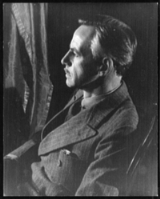
. His poetically titled plays were among the first to introduce into American drama techniques of realism earlier associated with Russian playwright Anton Chekhov
, Norwegian playwright Henrik Ibsen
, and Swedish playwright August Strindberg
. His plays were among the first to include speeches in American vernacular
and involve characters on the fringes of society
, where they struggle to maintain their hopes and aspirations, but ultimately slide into disillusionment and despair.
It's queer they'd be allowin' the sick ones to read books when I'll bet it's the same lazy readin' in the house bought the half of them down with the consumption itself.![]()
Irish as a Paddy's pig.![]()
Supposing I was to tell you that it's just Beauty that's calling me, the beauty of the far off and unknown, the mystery and spell of the East which lures me in the books I've read, the need of the freedom of great wide spaces, the joy of wandering on and on — in quest of the secret which is hidden over there, beyond the horizon?![]()
You mustn't feel sorry for me. Don't you see I'm happy at last — free — free! — freed from the farm — free to wander on and on — eternally! Look! Isn't it beautiful beyond the hills? I can hear the old voices calling me to come — And this time I'm going! It isn't the end. It's a free beginning — the start of my voyage! I've won to my trip — the right of release — beyond the horizon! Oh, you ought to be glad — glad — for my sake!![]()
We'd be making sail in the dawn, with a fair breeze, singing a chanty song wid no care to it. And astern the land would be sinking low and dying out, but we'd give it no heed but a laugh, and never look behind. For the day that was, was enough, for we was free men — and I'm thinking 'tis only slaves do be giving heed to the day that's gone or the day to come — until they're old like me.![]()
Is it one wid this you'd be, Yank — black smoke from the funnels smudging the sea, smudging the decks — the bloody engines pounding and throbbing and shaking — wid divil a sight of sun or a breath of clean air — choking our lungs wid coal dust — breaking our backs and hearts in the hell of the stokehole — feeding the bloody furnace — feeding our lives along wid the coal, I'm thinking — caged in by steel from a sight of the sky like bloody apes in the Zoo!![]()
Or rather, I inherited the acquired trait of the by-product, wealth, but none of the energy, none of the strength of the steel that made it. I am sired by gold and damned by it, as they say at the race track — damned in more ways than one.![]()
You seem to be going in for sincerity today. It isn't becoming to you, really — except as an obvious pose. Be as artificial as you are, I advise. There's a sort of sincerity in that, you know. And, after all, you must confess you like that better.![]()
We have electrocuted your God. Don't be a fool.![]()
Don't cry. The damned don't cry.![]()

